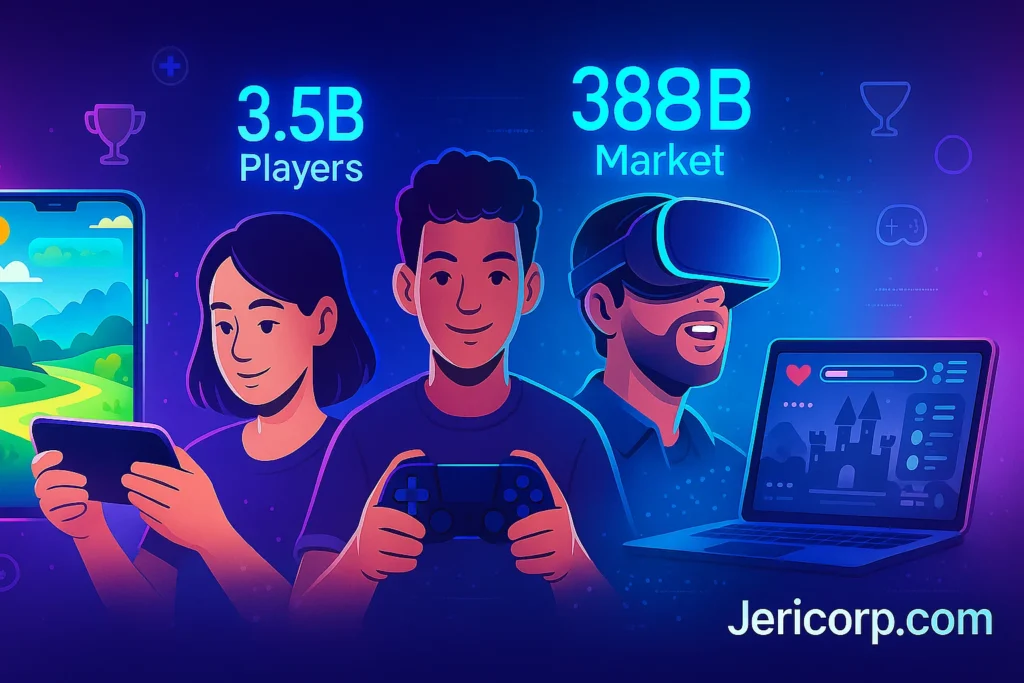Gaming has evolved from a niche hobby into a global phenomenon that touches nearly every aspect of modern life. Whether you’re curious about the gaming world or looking to understand today’s industry landscape, this guide covers everything you need to know about gaming in 2025.
Hi there! I’m Bonnie Ruberg, a gaming content writer with over a decade of experience covering the interactive entertainment industry. Throughout my career, I’ve witnessed gaming transform from simple arcade experiences to complex digital ecosystems. In this article, I’ll share insights about what gaming truly means today and why it has become such a significant cultural force worldwide.
What is Gaming? Understanding the Modern Definition
Gaming refers to playing video games – interactive digital experiences that combine entertainment, challenge, and social interaction. However, this simple definition barely scratches the surface of what gaming represents in 2025. Today’s gaming encompasses everything from casual mobile puzzle games to competitive esports tournaments watched by millions.
The beauty of gaming lies in its versatility and accessibility. Unlike traditional entertainment that requires passive consumption, games actively engage players, requiring input, decision-making, and skill development. This interactive nature creates unique entertainment that can be simultaneously relaxing and challenging, social and solitary.
In my years covering the industry, I’ve observed how gaming’s definition has expanded dramatically. What once required expensive consoles can now be experienced on smartphones. This democratization has made gaming universal, with current statistics showing that over 3.5 billion people worldwide engage with games in some form.
The Evolution of Gaming: From Pixels to Possibilities
Understanding today’s gaming requires looking at its remarkable journey through several revolutionary phases:
- Arcade Era: Games like Pac-Man established simple but addictive gameplay
- Home Console Revolution: Brought gaming into households worldwide
- Internet Transformation: Created online communities and multiplayer experiences
- Mobile Gaming Boom: Made gaming accessible to everyone with smartphones
The early days focused on straightforward gameplay mechanics that were easy to learn but difficult to master. Personal computers and consoles created dedicated gaming enthusiasts, while the internet transformed gaming from single-player to social experiences. Mobile gaming represents the most significant recent evolution, making gaming accessible to demographics that never considered themselves gamers.
Current Gaming Industry Statistics and Market Size
The numbers surrounding gaming in 2025 demonstrate just how massive this industry has become. 3.32 billion people are playing video games worldwide in 2024, and that number is projected to exceed 3.5 billion in 2025. This represents nearly half the world’s population engaging with gaming content.
From a financial perspective, the Online Gaming market is expected to reach US$ 388.10 billion by 2033 from US$ 152.58 billion in 2024, with significant growth outpacing traditional entertainment sectors. Mobile gaming continues to dominate, with the global mobile gaming market expected to reach $160 billion by 2025, making up over 50% of total gaming revenue.
The demographic spread has evolved dramatically. About 85% of global consumers engage with games in some form, and 80% actually play games. This widespread adoption has shattered stereotypes, with diverse age groups and genders representing significant portions of the gaming community.
Types of Gaming: Platforms and Experiences
Gaming in 2025 offers unprecedented variety across different platforms, each catering to different preferences and lifestyles.
- Mobile gaming represents the largest segment. Smartphones have made gaming incredibly accessible, allowing people to play anywhere. Games range from simple puzzles to complex strategies rivaling PC counterparts.
- Console gaming remains the choice for serious gamers seeking high-quality graphics and immersive experiences. Modern consoles offer blockbuster gaming experiences spanning dozens of hours.
- PC gaming provides maximum flexibility and customization. PC gamers can modify hardware for optimal performance and access extensive game libraries spanning decades.
- Cloud gaming is revolutionary, with the global cloud gaming market forecast to reach $8+ billion by 2025. Services allow streaming high-quality games without expensive hardware, making premium experiences accessible to anyone with stable internet.
The Social Aspect of Gaming: Building Communities and Connections
Modern gaming has transformed from solitary activity to deeply social experience. Online multiplayer games create virtual spaces where people collaborate, compete, and socialize across geographical boundaries.
I’ve personally witnessed gaming communities provide crucial support networks for individuals facing real-world challenges, demonstrating gaming’s positive social impact. Streaming platforms like Twitch have transformed gaming into spectator sport, with millions watching favorite gamers play.
Key social elements include:
- Online Communities: Virtual spaces fostering lasting friendships
- Streaming Culture: Interactive entertainment combining skill and personality
- Esports: Professional competitive gaming with massive audiences
- Educational Networks: Skill development and professional opportunities
Gaming Technology and Innovation in 2025
Gaming technology continues advancing at remarkable pace. About one in three developers now use generative AI tools in their workflow for procedural content generation, dialogue creation, and level design.
Artificial intelligence is revolutionizing development and player experiences. AI-powered tools streamline content creation, enabling smaller teams to create ambitious projects. Graphics technology pushes toward photorealism with real-time ray tracing and advanced lighting systems.
Cross-platform compatibility has become crucial, allowing seamless play across different devices. Advanced haptic feedback creates more tactile experiences, simulating textures and environmental conditions beyond visual and audio feedback.
Economic Impact and Career Opportunities
The gaming industry has become a significant economic force creating numerous career opportunities beyond traditional development roles. The expansion has spawned entire supporting ecosystems from specialized marketing agencies to gaming-focused financial services.
Career paths now include:
- Traditional Development: Programming, art, design, sound engineering
- Content Creation: Streaming, video production, social media management
- Esports Industry: Players, coaches, broadcasters, event organization
- Gaming Media: Journalism, reviews, analysis, marketing specialists
Content creation and streaming have become viable careers for skilled entertainers. Successful creators earn through advertising, sponsorships, and merchandise. Esports has generated professional opportunities similar to traditional sports industries.
Educational Gaming and Serious Applications
Gaming’s potential extends beyond entertainment into education and professional training. The interactive nature makes games powerful tools for learning and skill development across various fields.
Educational games effectively teach everything from basic literacy to complex scientific concepts. Gamification leverages natural engagement mechanisms making education more enjoyable and effective. Students often retain information better through interactive gaming rather than passive learning.
Professional training uses gaming technology for high-stakes preparation without real-world risks. Medical professionals practice procedures virtually, pilots train in simulators, and military personnel develop tactical skills through realistic scenarios.
Gaming Culture and Its Global Impact
Gaming has developed rich culture with unique languages and traditions influencing broader society. Gaming terminology has entered mainstream vocabulary, with phrases like “leveling up” and “achievement unlocked” describing real-world situations.
Gaming conventions have become major cultural gatherings celebrating communities and showcasing developments. The influence on other media is apparent through successful game adaptations in movies and television.
Gaming’s global reach creates opportunities for cultural exchange. Players from different countries interact regularly, sharing perspectives through this uniquely global entertainment medium.
Challenges and Concerns in Modern Gaming
While gaming’s growth is largely positive, several challenges require ongoing attention. Gaming addiction and excessive play time have become concerns, particularly for younger players. The industry is implementing features helping players manage gaming time more effectively.
Main challenges include:
- Gaming Addiction: Problematic playing behaviors interfering with life
- Online Harassment: Toxic behavior creating unwelcoming environments
- Privacy Concerns: Data collection and security issues
- Accessibility Costs: Financial barriers to premium gaming experiences
Gaming companies are investing in better moderation tools and transparent data handling practices to address these issues.
The Future of Gaming: Trends and Predictions
Several trends will shape gaming’s continued evolution. In 2025, gaming is not just entertainment. It’s education, socialization, commerce, and art – all in one evolving medium.
Artificial intelligence will play larger roles in development and player experiences. We can expect more sophisticated AI-driven content generation and personalized gaming experiences adapting to individual preferences.
Virtual and augmented reality will achieve broader adoption as hardware becomes affordable. Cross-platform integration will advance with device-agnostic gaming experiences. The metaverse concept represents potential futures where gaming platforms become persistent virtual worlds serving multiple purposes.
Conclusion: Gaming’s Continued Evolution and Impact
Gaming in 2025 represents far more than entertainment – it’s a cultural phenomenon, economic force, and technological frontier reshaping digital interaction. From humble arcade beginnings to today’s complex ecosystems, gaming consistently pushes interactive media boundaries.
With over 3.5 billion players worldwide and market values reaching hundreds of billions, gaming has become one of the most significant modern industries. More importantly, gaming brings people together, provides educational opportunities, creates careers, and serves as platforms for creative expression.
As someone chronicling gaming’s evolution for over a decade, I’m continually amazed by the industry’s capacity for reinvention. Whether you’re a longtime gamer or just exploring this landscape, gaming offers something valuable for nearly everyone through its unique combination of entertainment, challenge, and social interaction.
Gaming isn’t just about playing anymore – it’s participating in a global community spanning cultures and interests, united by shared love of interactive experiences. As we move into an increasingly connected digital world, gaming will play an even more central role in how we learn, work, and entertain ourselves.
Bonnie Ruberg is a writer, researcher, and educator with deep experience in game studies and digital culture. An associate professor of film and media studies at the University of California, Irvine, they focus on the ways video games intersect with identity, gender, and sexuality. Their books Video Games Have Always Been Queer and The Queer Games Avant-Garde are widely cited for showing how LGBTQ+ creators and players shape the medium.
With years of teaching, publishing, and speaking at international conferences, Ruberg brings both academic insight and hands-on knowledge of the gaming world. Their work highlights how games can be spaces for creativity, critical thinking, and social change.


